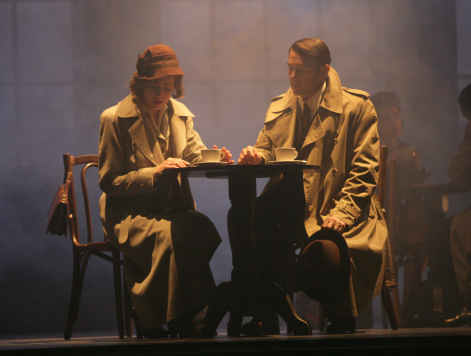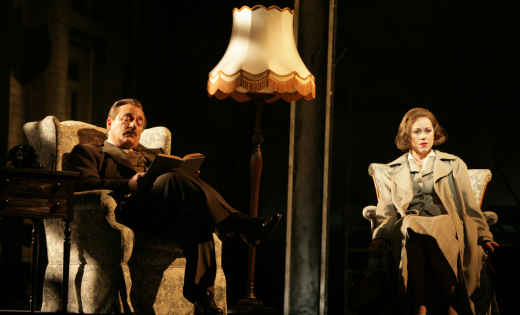Other Links
Editorial Board
-
Editor - Bill Kenny
-
Deputy Editor - Bob Briggs
Founder - Len Mullenger
Google Site Search
SEEN AND HEARD
INTERNATIONAL OPERA REVIEW
Previn, Brief Encounter:
(World premiere)
Soloists, Houston Grand Opera Orchestra and Chorus. Conductor: Patrick
Summers. Houston Grand Opera. 1.5.2009 (AS)
Director: John Caird
Sets: Bunny Christie
Costume designer: Bunny Christie
Lighting designer: Paul Pyant
Cast:
Laura Jesson:
Elizabeth Futral
True intimacy in opera is rare. Most of the most successful works of the last
century ignored small scale emotion in favor of the grandiose but American
composer André Previn breaks that mold in his newest opera Brief Encounter, which had its world premiere Friday night at Houston Grand Opera.
The supporting
roles were also sung well. American bass-baritone Kim Josephson was in fine
form as Fred, Laura’s husband. His rich voice projected clearly throughout the
house and he showed just the right amount of drama in his second act aria after
realizing Laura might be straying from him. Contralto Meredith Arwady boasted a
large voice and excellent comedic timing as she bustled about the train station
café in her HGO debut. Her sound can get a little too dark at times
and her diction suffers because of this. Robert Orth created a hilarious Albert
Godby and sang well with Arwady, his on-stage love interest. Conductor Patrick
Summers seemed to take much pleasure from the score as he tried to draw an
impassioned reading from the Houston Grand Opera Orchestra.
Alec Harvey: Nathan Gunn
Fred Jesson: Kim Josephson
Dolly Messiter: Rebekah Camm
Myrtle Bagot: Meredith Arwady
Albert Godby: Robert Orth
Dr. Graves: James J. Kee
Mary Norton: Jamie Barton
Ms. Rolandson: Faith Sherman
Stanley: Adam Cioffari
Beryl: Alioia Gianni

Elizabeth Futral as Laura Jesson and Nathan Gunn as Alec Harvey
Based on David Lean's 1945 film of Noel Coward's stage play, Brief Encounter
in its most basic form is a story of forbidden love. Baritone Nathan Gunn (as
Alec Harvey) and soprano Elizabeth Futral (as Laura Jesson) play two married
parents who, after a chance meeting in an English train station, develop an
infatuation that leads to a full-blown affair. As their relationship grows, so
does their guilt, eventually forcing the two to end their relationship and Alec
to leave the country. It’s not a terribly dramatic story: most of the opera
revolves around Alec and Laura’s various (public) meetings. In turn, their
interactions remain mostly civil and appropriate enough to avoid garnering
suspicion and judgmental eyes. Laura’s husband doesn’t know about the affair
until the end of the opera, so the only conflict in the work comes in the form
of Laura’s own feeling of shame and guilt. This take on the illicit affair
theme makes for an intimate story that places Futral’s Laura in the center of
the piece as she struggles with her decisions. Librettist John Caird (who also
directed) combined sections from the 1945 film with his own writing to produce
the text for the opera. For better or worse, so to speak - given that the
story is about fidelity in marriage - the libretto seemed at times more akin to
a film script than a musical text.
The music itself
touches on a myriad of both Romantic and contemporary compositional styles. It
does, however, remain tonal throughout the entire work, with frequent musical
conversations by sweeping string sections echoed by solo instrumentalists
(reminiscent of Bernstein in more than one place). One or two motifs pop up at
various times throughout the opera, including a minimalist locomotive suite at
the beginning of the second act that showed promise but was quickly pushed to
the side. The score grows very sentimental during the scenes that Futral and Gunn
shared together, with plaintive string melodies representing the couple’s
growing affection. Ultimately though, very little stood out in the music
and with Previn’s film score expertise in mind, it’s not
difficult not to make comparisons. His film music supports the action but
doesn’t take it over; his score for Brief Encounter similarly supports the singers but rarely shows
creativity that would draw attention to the non-vocal instrumentation. Futral
had the most music, appearing in almost every scene and being called upon to
sing practically every dynamic. She had easily the heaviest music of the
score, and mostly rose to the challenge. Gunn’s music was less developed but
still strong: without him there is no affair, but his music usually was
secondary to Futral’s. The comedic music of the supporting characters showed
typical lighter, quicker orchestration that bordered on atonality but never
quite got there.
Elizabeth Futral
sang a strong Laura, although her voice didn’t show anything uniquely special over the
course of the performance. Previn often called on her to sing over dense
orchestration which required her to sacrifice the beauty of her voice for power.
The role of Laura includes a few sections that approach arias but all of them fade before
reaching any real climax. Nathan Gunn sang an elegant Alec Harvey,
interestingly devoid of any overt sensuality. His top doesn’t bloom much
anymore, but Previn showed how well he can work with the capacities of his
singers by writing music for the American baritone that used his middle
voice and silken legato to great effect.

Kim Josephson (Fred) and
Elizabeth Futral (Laura)
One of the
stranger aspects of the production was the hodgepodge mix of accents employed by
the cast. The all-American team of singers struggled at times with very
affected English inflections, producing a strange American-English sound which
didn’t always come through clearly. Futral’s heavy music in particular didn’t
help, as she had to focus more on producing a sound large enough to get past
Previn’s orchestra and less on making sure her English accent was perfect.
Gunn utilized a strictly American pronunciation, while other characters overdid
Cockney accents to the point where their lines were difficult to understand.
Despite the variegated nature of dialects in London, it would be a
stretch to find a native Englishman with an American accent in an affair with an
English woman who sounds like she’s from Iowa. Clearer diction would have
worked wonders for the comprehension and believability of the storyline.
Set designer
Bunny Christie constructed elegant scenery that allowed for seamless flow
between the opera's numerous scene changes. A café inside the train
station where Alec and Laura first meet served as the primary set; its grey
tones and pre-war feel creating an atmosphere both well appointed and
neutral enough to serve as the backdrop for the other scenes, among them a
drawing room, river bank, boat house, and restaurant, all believably done. The
production crew imported authentic trees stripped of their leaves to create a
feel of autumn. Various forms of smoke, fog, and mist were all used to create a
grey atmosphere, both at the station, the river bank, and in the town. A
promenade remained in the background at all times and, depending on the scene,
served both as a train platform and the walkway along the river; lighting
designer Paul Pyant elegantly illuminating the stage to create an eerily
realistic water way. A large clock on the curtain gave way to a series of
clocks scattered around the set in a noticeable but non-pervasive pattern,
symbolising the strict schedule of both the train station and the meetings
between Alec and Laura.
As far as HGO’s
patrons were concerned, the opera seemed to be a success. Most of the not-quite
sold out crowd stayed after the first intermission and gave a thunderous ovation
to the cast. Previn tried to stay anonymous among the orchestra sbut his
cover was blown by an enthusiastic Patrick Summers who pointed him out with a
smile. This Brief Encounter might not be the most compelling theatrical
work in the American repertoire, but HGO’s cast and production makes it a
worthwhile venture for the company.
Aaron Smith
Pictures © Felix Sanchez courtesy of Houston Grand Opera
Back
to Top
Cumulative Index Page
